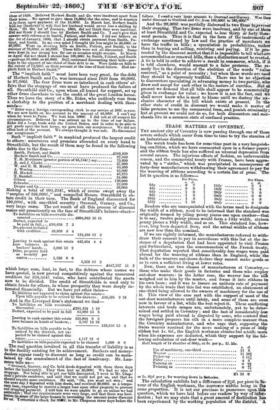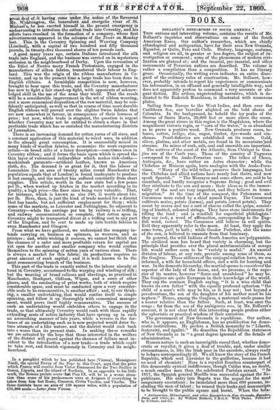.TRADE HATTERS AT COVENTRY.
Tun ancient city of Coventry is now passing through one Of 'those severe ordeals which occur from timeto time to try the stamina of an industrious district.
The watch trade has been for sometime pastin a verylanguish- ing condition, which we have commented-upon in a-former-paper; and the-ribbon trade'has• also suffered an unusual depression from several causes. The injurious effects of fashion, an unfavourable season, and the commercial treaty with Trans*, have been aggra- vated by a " strike," which was precipitated in consequence of forty -lour manufacturers withdrawing their agreement to:pay for the weaving of ribbons according 'to a certain list of prioe. The list in question is as follows-
Per-rises. -Per Piece.
a. 41. s. .4.
2dy 0 7 14dy 2 '1 4dy 0 9 l6dy '2 A
6dy '1 -0 Way
tkly 1 2 WY; 2 33 lOdy 1 13 30dy 4 .8
12dy 1 10 40dy 6 .0 Readers who are unacquainted with-the terms used�totlesign the width of a ribbon, need to be informed that the standard warms originally formed by piling penny pieces one upon another—that is to-say, twelve penny-pieces would form a 124 width, sixteen penny pieces a 16dy width, and so on. This standard has, how- ever, long been departed from, and the aotualvidths of ribbons are now less than the nominal.
If we are.rightly informed, the manufacturers referred to with- draw their consent to pay M accordance with this list at the -in- stance of a deputation that had been appointed to visit ,France and Switzerland, upon the consummation of the .French treaty. That deputation reported that .considerablyoless •wages were paid abroad for the weaving of ribbons than in England, while the bulk of the weavers out-doors declare they cannot make -goods so as to earn a sufficient living at lower rates.
Now, there are two classes of manufacturers at Coventry,— those who make their goods in factories and those who -employ out-door weavers : in the latter case, the weaver has the silk weighed out to him by the master, and forms it into -ribbons in his own loom ; and it was to insure an uniform rate of payment by the whole trade that this.list was established, an abatement of one-third being allowed to the owners of machinery for the use of it. This view of the case met with the support of most of the out-door manufacturers until lately, and some-of them are even now in favour of a list, while the rest reject-it. These conflicting interests and trade -usages are, unfortunately, .yet to be-deter- mined and settled in Coventry ; and the fact of considerably less wages being paid abroad is disputed by some, who contend that the foreigner prepares his silk in a more complete manner than the Coventry manufacturer, and who urge that, -supposing the Swiss weaver received for the mere making of a pieee• of 30dy ribbon but Is. 64, the English workman obtains but a trifle more when his expenses are deducted, which they support by the fol- lowing calculation of ont-door work—
Half length of 14 shuttles of 30dy, at Si. pup., 1/.452.
a. at.
Use of machinery, one-third 11 8 Weaver 11 10, Picker-up 6 Ilt Filler .. . -4 8 Turning on . 0 1 Twisting in
£1.15 -0 or Is. Std. perp. for weaving down in Sittoriee.
The calculation exhibits but a difference of 2.1-8. per,piecein fa- vour of the English workman, the narrower widths being in the same proportion. It is not our province to pronounce upon this question, which we have laid before our readers 'by way of infor- mation; but we may state that a great amount of destitution has been experienced by the working population of the district. A great ilea) of it having come under the notice of the Ilavgrend Mr. Widdrington, the, benevolent and energetic _vicar of St. Michael's, he has exerted himself in the present emergency iu endeavouring to introduce the cotton trade into Coventry, and his efforts have resulted- in the formation of a company, whose first advertisement appeared in the columns of the Times on Monday last. Thia is the Coventry Spinning and Weaving Company (Limited), with a capital of two hundred and fifty thousand pounds, in twenty-five thousand shares of ten pounds each. A good, nany years ago, certain Italians introduced the silk trade into England, and the business was carried on in mysterious seclusien in the neighbourhood of Derby. 'Upon the revocation of the Edict of Nantes many .French Protestants, engaged in the 'manufacture of silken fabrics; transferred their labour to Eng- land. This was the origin of the ribbon manufacture in Co- ventry, and up to the present time a large trade has been done in
English ribbons. A formidable competition is now, however, brought to bear upon this trade, and the Coventry manufacturer has now to ;fight a fair stand-up fight, with opponents of acknow- ledged skill in the use of the arms they wield. That the result be a considerable improvement in the art of ribbon weaving, and a more economical disposition of the raw material, may be con- fidently anticipated, as well as that in course of time more durable
English ribbons will prevail over the slighter Swiss fabrics that are now somewhat in favour, in consequence of their lowness of price ; but now, while trade is stagnant, the question is urgent whether. Coventry may not be entitled to obtain a share in that profitable trade which has so enriched the manufacturing districts of Lancashire. There is an increasing demand for cotton yarns of all sizes, and a constant application of this material to novel uses, in addition to the already, great consumption. It is successfully mixed in many kinds of woollen fabrics, to economize the more expensive article—in broad, silks of a fancy description—sometimes even in Coventry ribbon • and it forms the basis upon which is spread the thin layer of vulcanized indiarubber which makes rick-cloths- maolzintosh garments—artificial leather, known as American cloth, &c. The demand is so great for it, that the labour of Lancashire (in an area of twenty miles round Manchester the population equals that of London) is found inadequate to produce it fast enough, and the market has suffered constantly from short supplies. Ibis article, worth in the raw state but a few pence per lb., when worked up fetches in the market according to its quality, a high prieeLthe finer sizes being very valuable. That, for instance, which is known as size 240, is worth about 14s. per lb. Here, then,,is just the kind. of trade needed for a district that has hands; but not sufficient employment for them ; while some of the markets, as Leicester and Nottingham, lie adjacent to Coventry—while the carriage per ton by railway is so trifling, and railway. communication so complete, that cotton spun in Coventry might be transported direct at a trifling cost to any part of the kingdom, and be sent to made up into textile fabrics to even Manchester and. Glasgow. From what we have gathered, we understand the company in- tends carrying on business as spinners, as weavers, and as printers ; and, while wishing it success we cannot but think that the chances of a safer and more, profit4le return for capital are yet open for another and- smaller company who would confine, themselves to the spinning of cotton yarn of various sizes. There is always a market for this fabric; its production requires no great amount of sunk capital ; and it is well known to be the most remunerating branch of the business. This part of the trade is exactly suited to the labour already at hand in Coventry, accustomed to the warping and winding of silk ; but the weaving, of broad calicoes and aheetings, as practised in Manchester, Stockport, Oldham, Wigan, and a score of other places, and the conducting of print works both of which require considerable ' erable space, and must be conducted npon a very consider- able scale to be remunerative, is another affairand, to our think ing, a smaller undertaking, that would confine itself to simple spinning, and follow it up thoroughly with economical manage- ment, would prove itself highly remunerative. The success of such• an undertaking- would embolden others to engage in the trade, so that ultimately Coventry would rank with those rapidly extending seats of active industry that have sprung up in such an astomshing manner of late years, while a reverse in the for- tunes of an undertaking such as is now projected would deter fu- ture attempts of a like nature, and the district would sink back into a worse than its present state. In making the se remarks we are actuated by the hope that those interested in the welfare of the district will guard against the chances of failure most in- cident to the introduction of a new-trade—a trade which ought to take root, and flourish vigorously in Coventry and its neigh- bourhood.
In a pamphlet which be has published here (Vienna), Monsignore Nardi, the special Envoy of the Pope to this Court, says that the price which France will receive froth Victor Emmanuel for the Two Sicilies is Genoa, Liguria, and the island of Sardinia. In an appendix to his little work, the Roman prelate avers that Pius I/. will be in a worse situa- tion than some of his 'predecessors were at Avignon if everything is taken from him but Rome, Comarca, Civita Veechia, and Viterho. The three distiiets: have an-area of 120 square miles, with a popUlation of 476,1100 soma,-Letter from Vienna.



























 Previous page
Previous page